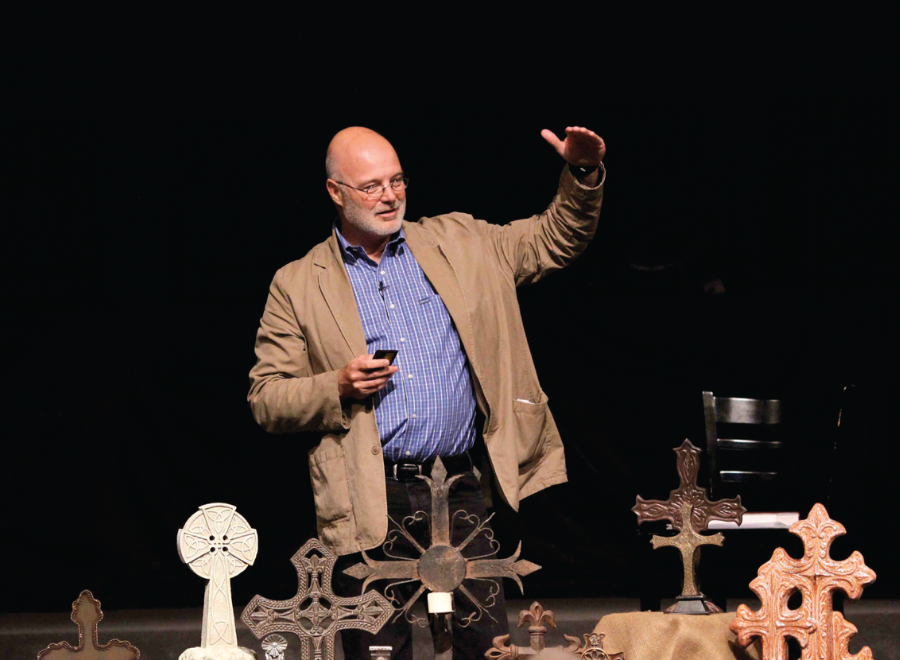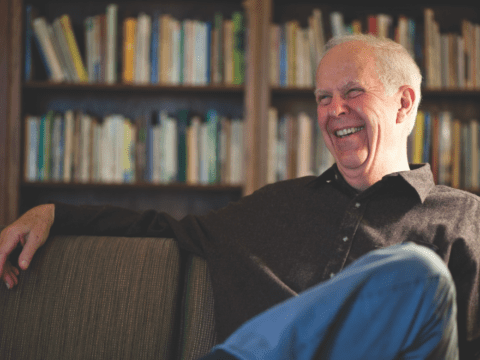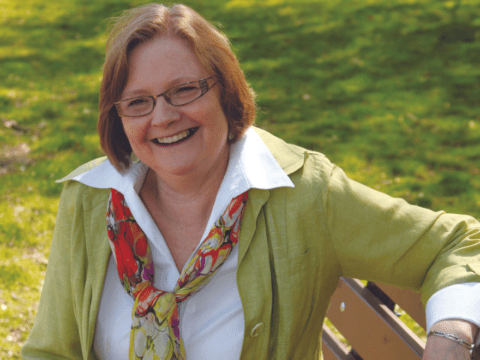“God loves you, and Jesus will see you through the storms of life,” proclaims the young African-American preacher to his startled makeshift congregation on a commuter train somewhere between the Garrard and West End stations. I have just arrived in southwest Atlanta to attend a festival of preaching. I didn’t expect to hear a sermon before I even checked into the hotel.
Maybe I shouldn’t be so surprised. In her opening address to 1,600 delegates gathered at well-to-do Peachtree Road United Methodist Church, theologian Barbara Brown Taylor welcomes us to the “Christ-haunted South,” one of North American Christianity’s last bulwarks. “In Georgia, every pastor, priest or minister is called ‘preacher.’” You don’t have to be in earshot of a grand pulpit occupied by the likes of Taylor and fellow Festival of Homiletics headliners Desmond Tutu, Tom Long and Brian McLaren to experience it. Preaching is as much a part of the culture here as biscuits and sausage gravy.
You may unsubscribe from any of our newsletters at any time.
What a far cry from The United Church of Canada today. I recall attending a friend’s ordination service and being surprised that there was no sermon included in the liturgy. I asked one of the organizers why. After all, wasn’t this a service where people were being ordained to Word, sacrament and pastoral care? The organizer replied, “Preaching just isn’t all that important anymore. Besides, we couldn’t think of any good preachers to ask.”
Preaching in our denomination may be losing its lustre. Worse still, strong preaching has become downright suspect, more properly the domain of wild-eyed TV evangelists wearing expensive suits and fake tans. Yet active, faithful laypeople that I meet in the United Church are hungry for biblical, relevant and passionate preaching. If St. Augustine was correct in calling preaching the “audible sacrament,” then we have a lot of people going away Sunday morning still yearning for an encounter with God. My sense is that people in United Church pews want better preaching than they’re getting.
The longing for great preaching from those who faithfully fill the pews each Sunday became clear to me at a Presbytery-wide workshop I offered last year. Designed to mimic a hit television show, it was called “So You Think You Can Preach?” and helped laypeople craft and deliver their own sermons on topics ranging from church history to biblical studies. The event was oversubscribed, with more than 30 parishioners eager to make the jump from pew to pulpit. Many told me they were disillusioned with the quality of preaching in the United Church today.
One night, Rev. Jean Stairs, the principal of Queen’s Theological College in Kingston, Ont., visited us and defined preaching as “participation in an event where we meet the living God and paradigms are changed through which we view reality.” A young layperson leaned over to a neighbour and whispered, “That’s the problem! We preach for change as if God isn’t even in the room instead of bringing people face to face with Christ and trusting that they, and the whole world around them, will be changed in the process.”
Not that this is easy to do. By practising the craft of preaching, these laypeople gained new respect and admiration for the skill great preaching demands. But their grumbling about the state of preaching only grew louder. “My minister says she only had to take one course in preaching at seminary, and yet every church that advertises for a minister says they want someone skilled in preaching,” complained one participant. “The problem today in our church isn’t preaching in general,” suggested another. “It’s just that poor preaching has become the norm.”
This sense of loss is not confined to the pews. Many in the pulpit feel it, too. As I make my way into the Festival of Homiletics, the number of fellow United Church ministers who have also trekked to Atlanta surprises me. (One of us, Rev. Anthony Bailey of Parkdale United in Ottawa, is a guest speaker.) We all understand, as did Martin Luther, that through preaching, Christ is absorbed into the congregation. We also understand that we can soak up ideas for the next 52 weeks of sermons ahead of us by basking in the presence of great preachers. In the pews of Atlanta churches the size of shopping malls, and afterward in parking lots and on patios, our United Church contingent huddles and exchanges ideas to take home to our waiting parishioners — people like the soft-spoken older person who observed wistfully to our So You Think You Can Preach group, “My minister says that preaching is passé, but many of us remember when the sermon was the most important part of the service.”
The United Church of Canada traces its roots through Methodism, Presbyterianism and Congregationalism to strong and vibrant preaching traditions reaching back to the Reformation. At Church Union in 1925, the great hope for The United Church of Canada was that it held evangelism and social justice from these traditions in creative tension and believed deeply that they informed one another. Somehow we’ve lost that. As social justice outflanked evangelism, preaching declined. The great preachers of our denomination, from Very Rev. George Pidgeon to Rev. Andrew Lawson and Very Rev. Lois Wilson, were nurtured in such places as Pine Hill Divinity School in the Maritimes and refined in the fire of settlement sites such as the wheat fields of Saskatchewan and the outports of Newfoundland.
These days, preaching is included within a broader pastoral studies curriculum at the United Church’s six theological colleges, with other issues ranging from congregational conflict to ministerial self-care. While every student takes a basic course in preaching, only two of the colleges dedicate the resources of a full-time professor to the subject. One of these instructors is Paul Scott Wilson of Emmanuel College in Toronto, and he’s acutely aware of the growing preaching deficit in the United Church today.
“I can say readily what I think is wrong with preaching in our church,” he says. “Our sermons tend to be high on what we are to do and low on what God does and empowers, particularly through Jesus Christ in the Holy Spirit. The important tasks of social justice end up trumping the Gospel, which is often nowhere to be found.”
Far from suggesting that there is no appetite for great preaching in the United Church, Wilson’s comments remind me how the breakdown between proclamation and practice is hurting the church. If baking pies, signing a petition or hammering a nail now represent our comfort zone, speaking words of faith in the church and community will naturally take on a stigma after a while. Perhaps that’s why I run into so many United Church people who claim to focus more on living their faith than speaking it, and quote the old adage, “Preach the Gospel and, when necessary, use words.”
This popular advice, from that kooky animal-loving priest St. Francis, offers tongue-tied Christians a convenient out that saves them from the embarrassment of speaking words of faith in an increasingly hostile and secular Canadian context.
But remember: St. Francis lived in the heart of Christendom when kind deeds would naturally be interpreted as Christian practice. In post-Christendom Canada, we are more like the early apostles — forced to speak apologetically in light of God’s action in the world.
The new reality requires United Church leaders to retrain and refocus their preaching. Perhaps that’s why so many journey to preaching conferences, and it may explain why many at this year’s Festival of Homiletics are so excited to hear Brian McLaren. He’s the guru of the Emerging Church movement, which offers a new model for churches that combines social justice and evangelism while blurring the old liberal-conservative battle lines.
The ornate Methodist chapel where McLaren is scheduled to speak is filled to overflowing with preachers dressed in everything from suits and ties to loud Hawaiian shirts. The chancel is packed with projection screens and guitars. It’s stiflingly hot, and the room buzzes with anticipation.
I sit down cross-legged in the aisle and chat with the person next to me. “So this is the new Saviour?” he snorts. It turns out the man is a journalist keen to learn more about the Emerging Church movement. “What I want to know is what preaching is going to look like for this next generation,” he says in a more serious tone. I think that is the question that all of us are here trying to figure out: not whether preaching has a future, but what effective preaching will look, feel and sound like.
McLaren doesn’t disappoint. He speaks like a football coach pep-talking his team at halftime. “Now more than ever, the world needs the Gospel,” he declares. Socially aware preachers need to speak up amid all the dreams that have been dashed by the crash of capitalism. McLaren urges his audience to be more authentic in their witness, to confess their fears and foibles in order to highlight our collective dependence on the grace of God through the cross of Christ. It is an invitation for preachers to be less “Masters of Divinity” and more fellow disciples — students of the risen Christ who are constantly in a state of study and discovery in the way and cross of Christ.
Across the hall later that day, headliner Anna Carter Florence picks up on this theme of authenticity, offering a strong feminist endorsement of the Christian practice of speaking our faith in the public arena. I start to realize that whatever preaching may look like in the future, the outcome of preaching has to be more than a friendly handshake at the door and a “thanks for the sermon, see you next week.”
Emergent preaching in post-Christendom Canada must lead to encounters with the risen Christ and the empowerment of all people to take their faith, through words and actions, out into the world. As preachers, we are doing our best work when our members know what to say, and what not to say, in the boardroom, the hockey rink and the playground.
In that sense, the most effective sermon I heard at this convention may well have been the one I heard on the commuter train coming here. Our polite, restrained Canadian sensibilities may not allow for public displays of faith on the Vancouver Skytrain or the Toronto subway or the Dartmouth ferry. Yet a passionate, authentic and biblically-focused diet of preaching on Sunday mornings does give hope for a life of faith and witness by our members in this sin-sick, soul-searching and spiritually hungry world God loves so much.
***
This story first appeared in The United Church Observer’s September 2009 issue with the title “Hungry for the word.”
Rev. Ross Lockhart holds a doctorate in preaching from McCormick Theological Seminary in Chicago. He recently accepted a call to West Vancouver United.















